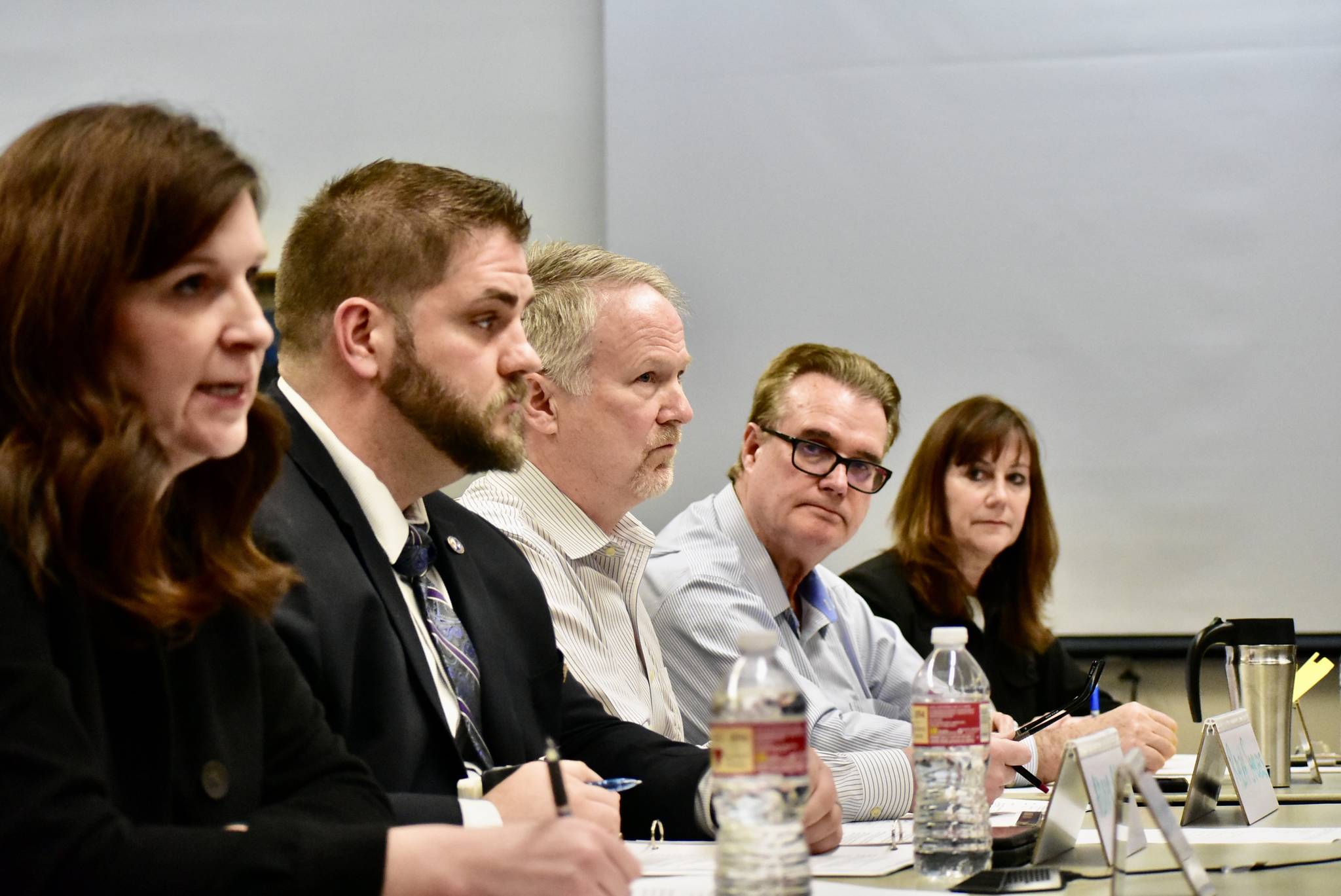The Assembly Chambers at Juneau City Hall was packed with people Monday night for a special meeting of the Committee of the Whole to address growing concerns about COVID-19 and the coming arrival of the MS Westerdam, a cruise ship denied from ports in East Asia over health concerns.
With representatives from the city, state, health care and cruise ship industries, a panel of experts told the committee the state was prepared to handle any cases of coronavirus that will likely surface in the state.
“This is an unprecedented situation,” City Manager Rorie Watt said, “We don’t have all the answers, but neither do the experts worldwide.”
New information arises every day, Watt said, and governments and health agencies across the globe are learning as events unfold.
The chamber was so full that many people had to listen from a conference room upstairs at City Hall. No public testimony or questions were taken at the meeting, but citizens had sent in hundreds of questions to the committee in the days before.
Many of those concerns centered around the Westerdam. Ralph Samuels, vice president of government and community relations for the ship’s owner Holland America, said the vessel was currently on its way to Hawaii.
The ship had been turned away from ports in East Asia over concerns about the coronavirus, Samuels said, but at the time the ship had been denied docking in South Korea and Japan there were no cases of the virus on board.
There was one case later, but detection of that case led to intense scrutiny of all the ship’s passengers and crew, none of whom tested positive for the virus.
[State, local and federal governments working on coronavirus containment, Gov says]
When the ship arrives in Juneau, Samuels said, its crew will have been on board for over a month and will have been tested several times.
Officials at the meeting told the Committee there are protocols in place to deal with infectious disease, but extra precautions are still being taken.
“Were going to have a case in Alaska,” Watt said, “and I wouldn’t be surprised if we had one in Juneau.”
The city has to be ready for a rational discussion to take place if a person on a cruise ship is showing symptoms and many of the neighboring communities do not have the same resources Juneau does, Watt said. The city needs to be ready to help those communities and be prepared for a variety of “what-if scenarios,” he said.
Bartlett Regional Hospital CEO Chuck Bill said the hospital had the capacity to treat a number of patients and was ready to set up a special tent in order to triage any patients with the virus.
Overall, officials urged the public to remain calm and take commonsense measures to prevent the spread of disease.
Over time, Bill said the virus will most likely appear to look like an extreme form of the flu. There will be vaccines and other treatments that will allow people to “learn to live with it.”
Though the coronavirus does spread easily, Sara Hargrave, Southeast Alaska Regional Nurse Manager for the Alaska Public Health Association told the Committee, it’s mortality rate was low, estimated to be about 1-2%.
“The virus is fairly contagious,” Hargrave said, “however it’s not nearly as contagious as the measles.”
The virus spreads when droplets from an infected person, usually from sneezing or coughing, contact another person’s eyes or mouth, Hargrave said. The Centers for Disease Control and Prevention recommends good hygiene, avoiding crowds and remaining home in the event of a local outbreak.
Deputy Mayor Maria Gladziszewski urged people to be calm and kind to one another. There have been a number of reactions within the community, she said, sometimes prompted by misleading information on social media.
The Assembly is doing its best to provide accurate information to the public, she said.
Assembly member Carole Triem asked if anything is going to be done for the crew of the Westerdam’s mental health, considering they’ve been on the ship for so long.
[Live: Committee holds special meeting to answer virus questions, address concerns]
“Welcome the crew,” said Kirby Day with government and community relations for Holland America Group. Already a number of people have reached out to see if they can help crew members in any way. Eaglecrest Ski Area reached out to offer ski lessons to the crew, which consists mostly of Filipino and Indonesian people.
Many of the officials at the meeting pointed out that previous epidemics had been contained not solely by a cure, but by good hygiene. Washing hands, limiting contact with other people, and avoiding crowds were all ways to help prevent the spread of disease.
Officials encouraged people to contact their medical providers if they showed symptoms.
“This is not a theoretical thing, we are asking you to call your doctor,” Watt said.
• Contact reporter Peter Segall at 523-2228 or psegall@juneauempire.com.

